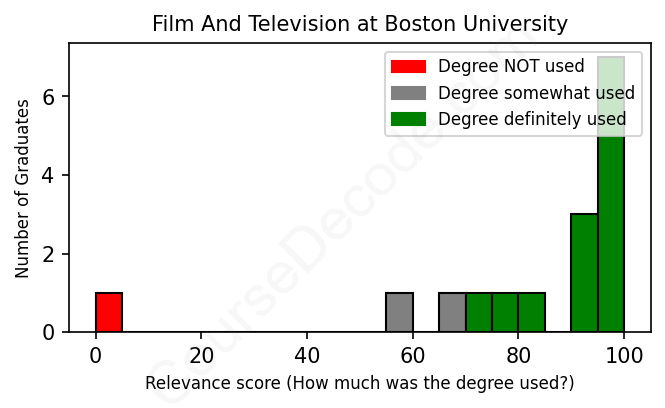
First, some facts. Of the Film And Television graduates from Boston University we've analyzed , here's how many have used (or NOT used) their degree in their career:

These are estimates based on AI analysis of 16 LinkedIn profiles (see below).
The verdict? Significantly above average. Overall, with an average relevance score of 82%, Film And Television graduates from Boston University have a much higher likelihood (+15%) of finding work in this field compared to the average graduate across all fields:
And for comparison, here's the chart for all profiles we've looked at across all degrees.
Also, after graduating, only 0% of these graduates have pursued further education other than another Bachelor's degree (such as a Masters degree or other), compared to the average across all profiles of 35%. This suggests a Bachelors degree is enough for most Film And Television graduates, and it's normal to look for work straight after graduation.
See the details:
|
Relevance score: 100% We think this person has gone into a career highly relevant to their degree. We think this person has gone into a career highly relevant to their degree.
DEGREE INFOGraduated in 2012 from Boston University with a Bachelor of Science in Film And Television. No other secondary education since. JOB HISTORY SINCE GRADUATIONDirector/Producer 2012 LOOKING BEIJING SUMMER DV PROJECT Jul 2012 - Jul 2012 Senior Cinematographer & Editor  Long Haul Films Sep 2012 - Oct 2016 Director/Filmmaker  Super Deluxe Nov 2016 - Oct 2018 Filmmaker  meganlovallo.com May 2012 - Present ABOUTI'm a filmmaker & photographer with a background in cinematography. I'm endlessly fascinated by identity, culture, music, the concept of time, nostalgia, technology, color theory, and nature. I love walking the line between rawness and glamour. I'm creatively and technically proficient at a lot of *things! Right now, I'm drawn to stories and imagery where, at their core, are poignant, evocative, and always filled with empathy. A driving force in my work is the human condition and our ability to feel deeply and connect strongly. I love collaboration, value diversity, and welcome change. I'm ambitious, resourceful, and confident in my decisions and actions. I hate to play it safe.*Will gladly talk more about these things. |
The top 10 most common jobs done by the graduates we've analyzed (ranked most common to least) are:
After looking through the various jobs that Boston University Film and Television graduates have held, it's clear that there's a mix of roles that are either relevant or not so relevant to their degree. The more common positions seem to be production-related roles like Production Manager, Post Production Producer, and various casting positions, which align closely with skills learned in their studies. These positions involve direct application of film and television knowledge, such as managing production schedules, overseeing post-production tasks, and understanding casting processes.
However, many graduates also found themselves in roles that aren't directly connected to film and television, such as administrative positions or internships that focus more on general support tasks rather than creative production. These kinds of jobs tend to dilute the relevance of their degree, as they don’t utilize the specialized skills they developed during their education. In summary, while many jobs reflect the skill set from their Film and Television degree, a good number also venture into areas that lack a clear link to the industry, showing that the job market can be quite diverse for these graduates.
Here is a visual representation of the most common words in job titles for Film And Television graduates (this is across all Film And Television graduates we've analyzed, not just those who went to Boston University):

Graduates from Boston University with a degree in Film and Television often kick off their careers in various entry-level positions, notably internships or production assistant roles. For instance, many of those from the Class of 2012 started as interns in notable companies and quickly made their way into more structured production roles. Even in a challenging industry like film and television, it's common to see new grads landing jobs such as production coordinators, assistant producers, or even freelance options just a year or two after graduation. This trend exemplifies a proactive approach: they often embrace flexibility and a freelance lifestyle to gain diverse experiences.
Fast forward five to ten years, and the career trajectories seem quite varied. Some of these graduates have successfully transitioned into more prominent roles as producers, directors, or even executives in production companies, showcasing a clear upward movement. In fact, numerous alumni end up in specialized areas, such as casting or development, indicating they’re carving out robust niches in the industry. However, not all stories are rosy; some have taken detours into unrelated fields or found themselves in long stints of freelance work without a steady career path. Overall, it appears that while many graduates secure opportunities that align well with their degrees, the path can often be more serpentine than straight-forward, reflecting the unpredictable nature of the entertainment industry.
Getting a Bachelor’s degree in Film and Television, whether at Boston University or anywhere else, can be a pretty intense experience, but it really depends on what you put into it. On one hand, the coursework can be super engaging and creative—think hands-on projects, film analysis, and maybe even some exciting production work. But don’t be fooled; it can also be demanding. You’ll have to balance classes, projects, sometimes long hours on set, and deadlines that can feel pretty relentless. So, in a nutshell, it’s definitely not a walk in the park, but if you’re passionate about film and TV, you might find it more fun than hard. Just be prepared to work hard and stay committed, and it can be a rewarding experience!
Most commonly, in the LinkedIn profiles we've looked at, it takes people 4 years to finish a Bachelor degree in Film And Television.
Looking at the job histories of these Boston University Film and Television grads, it seems like they've had a pretty wild ride since graduation, but the money game appears to be hit-or-miss. Many of them started with internships and assistant roles, which typically come with lower pay, and then slowly climbed the ladder to more established positions like producers or specialized artists. Some have made decent strides, especially those who landed roles in established studios and agencies, but others might still be hustling as freelancers or in entry-level jobs. So, while it looks like a few have potentially found some solid financial footing, a lot of them seem to still be working their way up in an industry that's famously tough on salaries for newbies. Overall, it’s a mixed bag—just like any creative field, you gotta be patient and ready for the grind!
Here is a visual representation of the most common words seen in the "about" section of LinkedIn profiles who have a Bachelor degree in Film And Television (this is across all Film And Television graduates we've analyzed, not just those who went to Boston University). This may or may not be useful:

Here are all colleges offering a Bachelor degree in Film And Television (ordered by the average relevance score of their Film And Television graduates, best to worst) where we have analyzed at least 10 of their graduates:
| College | Score | Count |
|---|---|---|
 Boston University Boston University
|
82 | 16 |
 New York University New York University
|
67 | 23 |